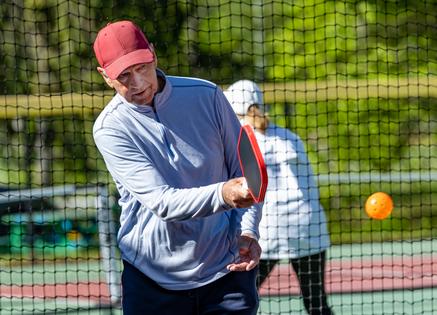‘I play pickleball in retirement.’ Is it HSA-eligible?
Published in Health & Fitness
Chances are, you’ve heard of the Trump megabill that was recently signed into law. The so-called “One Big Beautiful Bill“ (OBBB) is garnering chatter and for good reason: A lot is included in the mega legislation.
But even though many provisions survived the bill’s initial proposal, several did not. For instance, under the originally proposed megabill, gym memberships — and therefore pickleball courts in gyms — could have been eligible expenses for Health Savings Accounts (HSAs). HSAs are tax-advantaged savings accounts that allow pre-tax contributions and tax-free withdrawals for qualified medical expenses.
While the provision to make gym memberships HSA-eligible didn’t make it into the final version of the OBBB, you may still be able to claim certain expenses for staying active in retirement.
Stay active in retirement with HSA-eligible expenses
Retirees may use HSAs to save on taxes while playing sports — or by participating in other exercises — in retirement.
For instance, as a pickleball player (or “pickler”) myself, I often put in contact lenses when I go out to play. Prescription contact lenses and glasses are HSA-eligible.
Here are a few other examples of HSA-eligible expenses for retirees who like to stay active:
But you may be wondering: Is sports equipment or facility usage HSA-eligible? Well, that depends.
If you meet the strict guidelines of having a “Letter of Medical Necessity” (LMN) from a doctor specifying that, say, “golf” is medically necessary for the specific condition you have, then your golf expenses might be HSA-eligible. However, that rarely happens and is often not the case.
And while you can use HSA funds for a non-qualified expense, like pickleball, without penalty after you reach 65 years old, the withdrawal would be considered taxable income.
But that shouldn’t stop you from reaping the health benefits of staying active in retirement.
Best sports for older adults may increase life span
Exercising is tough for all ages, but it can be particularly difficult as you get older. Human bodies don’t work the same at age ten as they do at age 70.
However, exercising in retirement can significantly improve your health. The Physical Activity Guidelines for Americans, released by the U.S. Department of Health and Human Services, suggests that 150 minutes of brisk walking or 75 minutes of running each week may help you live longer.
And according to AARP, ten types of exercise can help you achieve a longer lifespan. Here are the top five:
Other popular exercises in retirement include golf, tennis, and badminton. I tend to gravitate towards pickleball or aerobics classes myself (town or city-led community centers can have cheaper class rates and feature more older adults than maybe privately-led sessions). But it’s really a matter of personal preference.
Of course, as with all exercises, it’s important to take things slowly, ensure you have the proper form, and talk to a doctor if you’re unsure whether an exercise is right for you.
Fun retirement ideas that help your tax bill
If you’re looking for a way to save on taxes and are not so much into fitness, no biggie. There are plenty of fun activities to do in retirement with added tax benefits. Here are a few of our favorites:
Whatever you choose to do in retirement, be sure it’s right for you. That can be trying a new activity while saving on tax, or reaping the health merits (and perhaps HSA benefits) by staying active. Either way, there are a plethora of ideas out there to help you get started.
And who knows? Maybe future changes on Capitol Hill will lead to an HSA-eligible gym membership, as initially proposed in the so-called “One Big Beautiful Bill.” We can dream, right?
(Kate Schubel is a tax writer for Kiplinger.com.)
©2025 The Kiplinger Washington Editors, Inc. All rights reserved. Distributed by Tribune Content Agency, LLC.










Comments